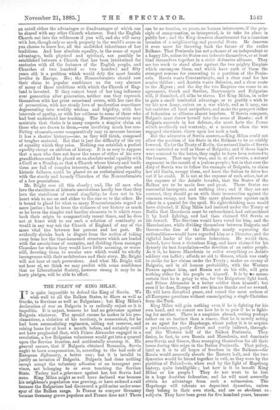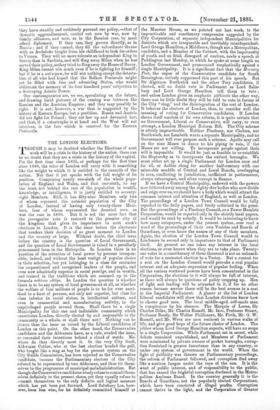THE POLICY OF KING MILAN.
IT is quite impossible to defend the King of Servia. We wish well to all the Balkan States, to Slays as well as Greeks, to Servians as well as Bulgarians ; but King Milan's declaration of war on Bulgaria is as radically unjust as it is impolitic. It is unjust, because he had no grievance against Bulgaria whatever. The special excuse he makes in his pro- clamations, a violation of his territory, is nonsensical, for he had been accumulating regiments, calling out reserves, and raising loans for at least a month before, and certainly could not have prophesied that, with Prince Alexander engaged in a revolution, a few Bulgarian volunteers would get into a quarrel upon the Servian frontier, and accidentally overstep it. His general excuse, that if Bulgaria obtained Roumelia, Servia ought to have compensation, is, according to the bad code of European diplomacy, a better one ; but it is invalid to justify an invasion of Bulgaria. Bulgaria had done nothing except accept the voluntary adhesion of an insurgent pro- vince, not belonging to or even touching the Servian State. Turkey had a grievance against her, but Servia had none. Kiag Milan might as well have declared war because his- neighbour's population was growing, or have ordered a raid because the Bulgarians had discovered a gold-mine under some spur of the Balkan range. Is France to conquer Germany because Germany grows populous and France does not There
can be no treaties, no peace, no human intercourse, if the prin- ciple of compensation, so interpreted, is to take its place in public law ; and the King deserves chastisement for a causeless invasion of a neighbouring and peaceful State. He deserves it even more for throwing back the future of the entire Balkans. That Peninsula has not a chance of an independent or a happy life, unless its States can federate themselves, or at least bind themselves together in a strict defensive alliance. They are too weak to stand alone against the two mighty Empires which encompass them, and which have each of them the strongest reasons for consenting to a partition of the Penin- sula. Russia wants Constantinople, and a clear road for her armies thither ; and Austria wants Salonica, and a clear route to the Egean ; and the day the two Empires can come to an agreement, Greek and Servian, Montenegrin and Bulgarian will, if disunited, all alike be slaves. Yet King Milan, in order to gain a small territorial advantage, or to gratify a wish to try his new Army, enters on a war which, end as it may, can but embitter all local antipathies, and make the prospect either of federation or alliance almost hopeless. If Servia conquers, Bulgaria must throw herself into the arms of Russia ; and if Bulgaria succeeds in her defence, she must hate the Power which needlessly and wantonly, at a moment when she was engaged elsewhere, threw upon her such a task.
But the advocates of Servia answer,—King Milan could not allow the position of his State in the Balkans to be so visibly lowered. Under the Treaty of Berlin, the natural limits of Servia were curtailed as well as those of Bulgaria; and if those limits were restored to the latter, they ought to have been restored to the former. That may be true, and is, at all events, a natural argument in the mouth of a jealous people ; but in that case the duty of Servia was to follow the example of Bulgaria, to claim her old limits, occupy them, and leave the Sultan to drive her out if he could. It is not at the expense of each other, but at the expense of the Asiatic invader, that the States of the Balkan are to be made free and great. Those States are successful insurgents, and nothing else ; and if they are not content, they should go on with their insurrection against the common enemy, not turn like mere plunderers against each other in a quarrel for the spoil. No right-thinking man would have objected, if King Milan had insisted under the Treaty of Berlin that Macedonia must be enfranchised, had enfranchised it by hard fighting, and had then claimed Old Servia as his reward. The Servians would have voted for him, and the Macedonians, while dividing themselves between Bulgaria and Greece—the line of the Rhodope nearly separating the nationalities—would have regarded him as a liberator, and the rightful leader of the entire federation. He would then, indeed, have been a victorious King, and have claimed for his dynasty its best foundation—the devotion of an entire people. As it is, he leaves Macedonia to suffer everything an Asiatic soldiery can inflict ; affords no aid to Greece, which was ready to strike for her claims under the Treaty ; makes an enemy of Bulgaria, and in all human probability, with the Western Powers against him, and Russia not on his side, will gain nothing either for his people or himself. It is by to means certain that he is going to win, for the Bulgarians fight hard, and Prince Alexander is a better soldier than himself ; but even if he does, Europe will owe him no thanks and no reward. He will have disturbed peace, and raised the most serious of all European questions without emancipating a single Christian from the Turk.
King Milan will gain nothing even if he is fighting for his own hand, and we cannot see how he is to gain if he is fight- ing for another. There is a suspicion abroad, resting perhaps rather on an instinct than a reason, that he is merely acting as an agent for the Hapsburgs, whose policy it is to acquire a predominance, partly direct and partly indirect, through- out the Western half of the Balkan Peninsula. They desire, in fact, to own Bosnia and Macedonia, and dominate over Servia and Greece, thus recouping themselves for all their losses during this reign in the Italian Peninsula. That policy, fatal as it is to all hopes of freedom in the Balkans—for Russia would assuredly absorb the Eastern half, and the two dynasties would be bound together in evil, as they were by the partition of Poland—is, when read by the light of Hapsburg history, quite intelligible ; but how is it to benefit King Milan or his people ? They do not want to be lost in a huge Austrian federation, and he will most assuredly obtain no advantage from such a submersion. The Hapsburgs will tolerate no dependent dynasties, unless they belong to their own stock, and are as obedient as , subjects. They have been great for five hundred years, because
they have steadily and ruthlessly pursued one policy,—that of dynastic aggrandisement, carried out now by war, now by family alliances, and now, as in the Bosnian case, by most adroit diplomacy. If they can, they govern directly, as in Bosnia ; and if they cannot, they fill the subordinate throne with an Archduke taught from his childhood to look for orders to Vienna. They will no more tolerate an independent King in Servia than in Sardinia, and will fling away Milan when he has served their policy, as they tried to fling away the House of Savoy. King Milan cannot win much even if he is fighting for himself ; but if he is a cat's-paw, he will win nothing except the detesta- tion of all who had hoped that the Balkan Peninsula might yet be filled with free and advancing States, who would obliterate the memory of its four hundred years' subjection to a destroying Asiatic Power. Our contemporaries are, we see, speculating on the future, and drawing lurid _pictures of the coming war between the Russian and the Austrian Empires ; and they may possibly be right. It is not, however, a war that is suggested by the history of Eastern Europe, but a partition. Russia and Austria did not fight for Poland ; they cut her up and devoured her, and that, if a catastrophe is at hand and the West will not interfere, is the fate which is reserved for the Eastern Peninsula.



































 Previous page
Previous page